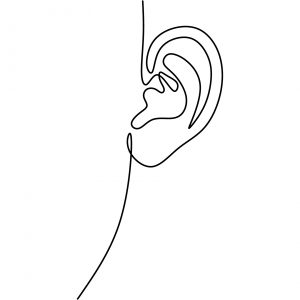
Between 2-8 May it’s Deaf Awareness Week and this year’s theme is ‘inclusion’
The Northeast Mental Health and Deafness service is raising awareness of the importance of supporting people who are deaf / deaf blind to access mental health services.
The service is a TEWV and CNTW partnership service for deaf and deaf/blind people aged 18 years or older who mainly use British Sign Language to communicate and who have mental health problems.
The team, work with local community mental health teams, offering assessment, treatment and advice, whilst ensuring that communications is accessible and meets people’s needs.
Emmanuel Chan, nurse at Tees, Esk and Wear Valleys NHS Foundation Trust (TEWV) said: “Deafness is an invisible disability. Deaf people do not always talk about this or expect others to treat them differently, and as a result, their communication and accessibility needs are not regularly met. This can lead to negative impacts on their access to information and services and responses towards care and support.
He also added: “The Northeast Mental Health and Deafness service makes a huge difference to people living across the Northeast as it helps them to feel more connected and included in their care. It’s so important that people are aware of the service and the support we can provide, so we’ve decided to run a number of activities during Deaf Awareness Week to help raise awareness.”
Andrew McMinn, Associate Director for Neurological and Specialist Services at Cumbria, Northumberland and Tyne and Wear NHS Foundation Trust (CNTW) said: “Deafness is an invisible disability. Deaf people do not always talk about this or expect others to treat them differently, and as a result, their communication and accessibility needs are not regularly met. This can lead to negative impacts on their access to information and services and responses towards care and support.”
Graham, a carer from Durham has experience of using the service and said: “The Mental Health and Deafness service has been really helpful in advocating concerns about my communication needs and helping me to get the support that I need. I’ve been able to access a Deaf personal assistant through social services, which now helps me to communicate without any barriers. I attend my wife’s care meeting and they help make sure that I’m understood and listened to, and this has allowed me to feel more informed in my wife’s care and the support available to me.
“The Deaf wellbeing group they run has also allowed me to meet fellow Deaf people and their carers and I no longer feel as alone as I did. They’ve helped me to accept the changes that are happening more, and as a result, I’ve felt more able to take break and look after myself and focus my interests and hobbies.
“I’ve even been introduced to more technology for Deaf people and how to access BSL information online, which is fantastic. Overall, the service has opened up a whole new world to me and I’m excited about ongoing learning and support in a signing environment.”
If you would like to find out more about support for people who are Deaf or Deaf/blind, or what’s happening across your area, the Northeast Mental Health and Deafness service are running the below activities between Tuesday 3 May and Thursday 5 May.
Activities
Tuesday 3 May
The Mental Health and Deaf Awareness Service and some members of the Deaf wellbeing group will be in the reception at West Park Hospital, Darlington, between 9.30am and midday on Tuesday 3 May to share information about our service and wider information about support for deaf people.
Wednesday 4 May
The Northeast and North Cumbria Deaf Network meeting will take place via MS Teams between 2pm and 3.30pm on Wednesday 4 May. The meeting is open to anyone and offers the opportunity to find out more about the Northeast Mental Health and Deaf Awareness Service. To register you interest email [email protected].
Thursday 5 May
You’re invited to join our Deaf Awareness Café, an online training session on Thursday 5 May between 9.30am and midday. The Café offers you the opportunity to find out more about Deaf mental health awareness, the Accessible Information Standard and British Sign Language (BSL). There’ll also be the opportunity for a short question and answer session after each topic. The training will be led by Cheryl Young (our team Deaf assistant practitioner) and supported by a BSL interpreter. To register you interest email [email protected].
If you live in the Northeast of England and are Deaf / deaf/blind and think you may have a mental health condition, please speak to your GP who will be able to make a referral to the Northeast Mental Health and Deafness Service for you. You can also find further information on the TEWV website for County Durham and Teesside (www.tewv.nhs.uk) and on the CNTW website for the rest of the Northeast (www.cntw.nhs.uk). Search Mental Health and Deafness.
In addition to the service people who are deaf or deaf/blind, can also contact their local teams using the Text Relay 18001 service or via the Text Relay apps.
